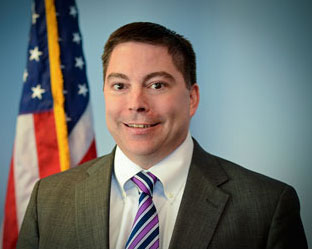By Adam R Jacobson
RBR + TVBR
“The thoughtful and collaborative process we are seeing in the AM revitalization world stands in sharp contrast to the Commission’s misguided, partisan decision in the recently concluded Quadrennial Review of media ownership rules.”
Now we know how FCC Commissioner Michael O’Rielly really thinks about the FCC’s party-line 3-2 decision to largely retain its 41-year-old cross-ownership rules, which prohibit common ownership of a newspaper and a broadcast properly without a waiver.
O’Rielly’s remarks came during a Tuesday (Oct. 18) address in Buffalo, at the International Broadcasters IdeaBank Conference.
A native of nearby Lockport, N.Y., O’Rielly opened his remarks on noting how a good part of his focus at the Commission has been “on opening closed doors for broadcasters to leverage new technology and reinvent themselves and the industry.”
He laments, “In many ways, the Commission’s approach to broadcasting remains stuck in a bygone era.”
Yet, he adds, there have been some “small successes and some movement in the past couple of years as one by one, outdated rules are being challenged and reformed.”
For example, O’Rielly suggested that the FCC act on a 2012 broadcaster petition to update the 40-year-old Contest Rule. “With consumers spending more and more of their time online and seeking information of every type there, it seemed nonsensical for the Commission to deny broadcasters the opportunity to put the terms of promotional contests online rather than speed-reading through long lists on-air,” he says.
The move to transition the public inspection files maintained by broadcasters to an online format was also highlighted as a step in the right direction for the FCC.
“While I may have preferred a more flexible approach, if we are going to require broadcasters to put their public files online, instead of providing a paper version to anyone walking in the door, they should be able to put all of their public files online,” O’Rielly says, adding that the FCC needs to follow through “on the benefits of the online public file by eliminating correspondence file requirements for broadcasters,” as he requested when the order was adopted.
Meanwhile, after “some nudging” on his part, streamlined procedures have made it “much simpler” for broadcasters to gain approval of new investments by foreign individuals or entities.
Still unresolved are the relaxation of the main studio rules.
“There is no reason to delay relatively simple and noncontroversial measures like this while trying to put together a larger package,” O’Rielly says.
Then, there’s the quadrennial review of the Commission’s cross-ownership rules, which he lambasted.
“You would think that the sea changes we have witnessed in the media space since the rules were last effectively updated in 1999 would dictate some major changes in the artificial market barriers initiated during the Johnson and Nixon Administrations,” O’Rielly says. “These rules may directly impact your business by constraining the permissible acquirers for stations, thus depressing station valuations. And, they apply only to broadcasters and newspapers, exempting all of the other players that have emerged in the media scene, such as streaming music services or satellite radio. Not that I would have any interest in extending the rules to other market segments, but it is incomprehensible and patently unfair that broadcasters alone should be kept on this particular regulatory leash while their competitors roam the radically expanded landscape relatively free of Commission interference.”
In 2017 and beyond, O’Rielly is hopeful that the Commission “will relent and take a more realistic view of the current media market, including non-broadcast and non-newspaper competitors in its analysis.”
He says, “In Washington, DC, the devil is in the definitions, and the Commission’s tunnel vision regarding the market you are dealing with is driving its continued poor decision making. An updated market definition could set the table for us to better promote localism, competition, and diversity by thoughtfully removing outdated restrictions to media combinations.”
RBR + TVBR





